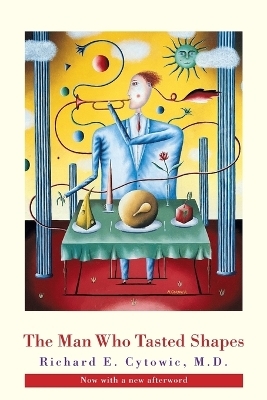
The Man Who Tasted Shapes
Seiten
2003
|
revised edition
Bradford Books (Verlag)
978-0-262-53255-6 (ISBN)
Bradford Books (Verlag)
978-0-262-53255-6 (ISBN)
In this medical detective adventure, Cytowic shows how synesthesia, or "joined sensation," illuminates a wide swath of mental life and leads to a new view of what it means to be human.
Richard Cytowic's dinner host apologized, "There aren't enough points on the chicken!" He felt flavor also as a physical shape in his hands, and the chicken had come out "too round." This offbeat comment in 1980 launched Cytowic's exploration into the oddity called synesthesia. He is one of the few world authorities on the subject. Sharing a root with anesthesia ("no sensation"), synesthesia means "joined sensation," whereby a voice, for example, is not only heard but also seen, felt, or tasted. The trait is involuntary, hereditary, and fairly common. It stayed a scientific mystery for two centuries until Cytowic's original experiments led to a neurological explanation-and to a new concept of brain organization that accentuates emotion over reason. That chicken dinner two decades ago led Cytowic to explore a deeper reality that, he argues, exists in everyone but is often just below the surface of awareness (which is why finding meaning in our lives can be elusive). In this medical detective adventure, Cytowic shows how synesthesia, far from being a mere curiosity, illuminates a wide swath of mental life and leads to a new view of what is means to be human-a view that turns upside down conventional ideas about reason, emotional knowledge, and self-understanding. This 2003 edition features a new afterword.
Richard Cytowic's dinner host apologized, "There aren't enough points on the chicken!" He felt flavor also as a physical shape in his hands, and the chicken had come out "too round." This offbeat comment in 1980 launched Cytowic's exploration into the oddity called synesthesia. He is one of the few world authorities on the subject. Sharing a root with anesthesia ("no sensation"), synesthesia means "joined sensation," whereby a voice, for example, is not only heard but also seen, felt, or tasted. The trait is involuntary, hereditary, and fairly common. It stayed a scientific mystery for two centuries until Cytowic's original experiments led to a neurological explanation-and to a new concept of brain organization that accentuates emotion over reason. That chicken dinner two decades ago led Cytowic to explore a deeper reality that, he argues, exists in everyone but is often just below the surface of awareness (which is why finding meaning in our lives can be elusive). In this medical detective adventure, Cytowic shows how synesthesia, far from being a mere curiosity, illuminates a wide swath of mental life and leads to a new view of what is means to be human-a view that turns upside down conventional ideas about reason, emotional knowledge, and self-understanding. This 2003 edition features a new afterword.
Richard E. Cytowic, M.D., MFA, a pioneering researcher in synesthesia, is Professor of Neurology at George Washington University. He is the author of Synesthesia: A Union of the Senses, The Man Who Tasted Shapes, The Neurological Side of Neuropsychology and (with David M. Eagleman) the Montaigne Medal-winner Wednesday Is Indigo Blue: Discovering the Brain of Synesthesia, all published by the MIT Press. Jonathan Cole, D.M., F.R.C.P., is Consultant in Clinical Neurophysiology, Poole Hospital, and at Salisbury Hospital (with its Spinal Centre), a Professor at Bournemouth University and a visiting Senior Lecturer, Southampton University.
| Erscheint lt. Verlag | 11.8.2003 |
|---|---|
| Reihe/Serie | A Bradford Book |
| Vorwort | Jonathan Cole |
| Zusatzinfo | 15 illus.; 15 Illustrations |
| Verlagsort | Massachusetts |
| Sprache | englisch |
| Maße | 152 x 229 mm |
| Gewicht | 408 g |
| Themenwelt | Sachbuch/Ratgeber ► Natur / Technik |
| Geisteswissenschaften ► Psychologie ► Biopsychologie / Neurowissenschaften | |
| Geisteswissenschaften ► Psychologie ► Verhaltenstherapie | |
| Medizin / Pharmazie ► Medizinische Fachgebiete ► Neurologie | |
| Naturwissenschaften ► Biologie ► Zoologie | |
| ISBN-10 | 0-262-53255-7 / 0262532557 |
| ISBN-13 | 978-0-262-53255-6 / 9780262532556 |
| Zustand | Neuware |
| Haben Sie eine Frage zum Produkt? |
Mehr entdecken
aus dem Bereich
aus dem Bereich
Grundlagen, Klinik, Rehabilitation
Buch | Softcover (2024)
Urban & Fischer in Elsevier (Verlag)
56,00 €
Begleit- und Folgeerkrankungen richtig erkennen und behandeln
Buch | Softcover (2023)
Kohlhammer (Verlag)
37,00 €
Buch | Spiralbindung (2022)
modernes lernen (Verlag)
29,95 €


